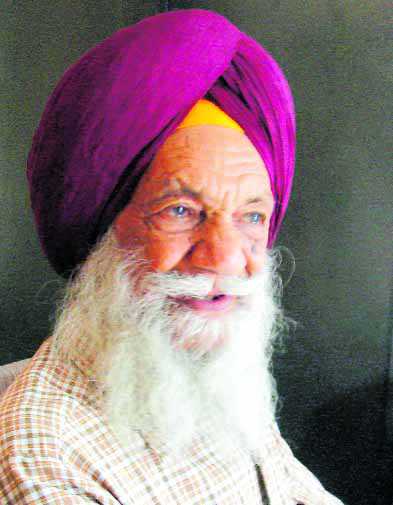Rahiye ab aisi jagah chal kar, jahan koi na ho,
Hum-sukhan koi na ho, aur hum zuban koi na ho,
Be dar-o-deewar sa ek ghar banaya chahiye
koi ham-saya na ho aur pasban koi na ho
Rough translation:
(Let’s go, live where there’s none else,
No one to speak to, none in language of one’s own,
Let’s build a house with no doors or walls — where,
there’s none to bother, none to watch over us).
If time is surmountable, Bhagwan Singh, 84, would softly whisper the Mirza Ghalib couplet to himself and to those who he might care to sit
with, a hundred times over, in a jarring blankness difficult to transliterate. It happens, he’d say, when a language known so well tends to disappear in the maze of borrowed, beguiling metaphors.
Qadian, known for the Ahmadiya community and the Sikh National College, recognises Bhagwan Singh as a man of letters, someone the lovers of Urdu poetry would turn to for knowing the true meaning of a word or the accompanying emotion. Such is his language proficiency that he receives calls from abroad with requests for help in translating poetry in Urdu and Persian. He has also been writing letters in longhand to editors for 27 years.
“Don’t praise me in your newspaper. I can’t be so weak as to be caught unawares in praise,” he says. “Letter writing is natural for anyone who feels strongly about something.” And when that happens, he’d pick up his pen and pad, draws a line in the centre and starts jotting down on the left side. An improved version is then written on the right side. When he thinks there are no more corrections to be made, he writes the ‘final version’, on a separate piece of paper.
The former employee of the Income Tax Department keeps his specs away when he writes. Each of his letters has been neatly pasted in blue files and preserved. The first one appeared on July 20, 1989.
“I recall the postman bringing the newspaper to my village Dattewal Bhinder, now in Narowal district in Pakistan, around noon every day. I started reading when I was in 7th in Moti Ram Arya High School. A Lahore-based publisher, who was my father’s friend, gifted me books on varied subjects in English. My house in my native village was always filled with books. Slowly, I started learning the language on my own. By the age of seven I could read and write fluently,” he says.
Bhagwan Singh prefers to spend his time in solitude in a small room in his house located in one of the circuitous lanes of this old town. Persian books, a transistor and a whirring table fan are his companions. “I love walking alone in the morning. In the afternoon I study Urdu poetry and once a week, I keep my date with letter writing. I do not like anybody interfering with my thoughts,” he says and takes yet another overseas call on his landline.
On the importance of writing letters, he says: “We lost so much when we stopped writing letters. They are so important in our lives. After all, we can not re-read a phone call.”
Unlock Exclusive Insights with The Tribune Premium
Take your experience further with Premium access.
Thought-provoking Opinions, Expert Analysis, In-depth Insights and other Member Only Benefits
Already a Member? Sign In Now











